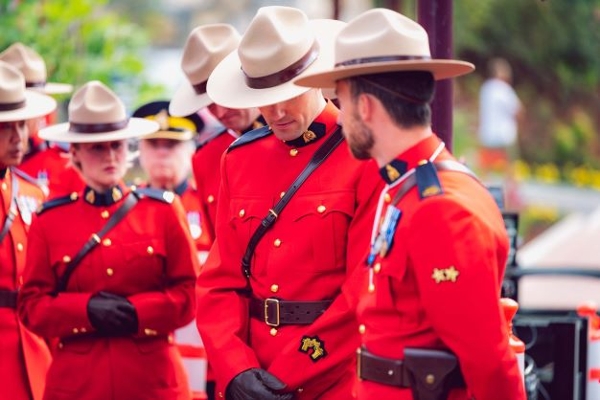
Reforming the RCMP: The Path Forward
Few Canadians would disagree with the statement that the Royal Canadian Mounted Police, probably Canada’s most iconic institution, is in trouble. But beyond a cacophony of public concerns over recent operational failures, there is much less consensus on either the cause or the cure.
By Kevin Lynch, former Vice-Chair of BMO Financial Group and former Clerk of the Privy Council; and Jim Mitchell, Adjunct Professor, Carleton University and former Assistant Secretary to the Cabinet, Machinery of GovernmentDownload the Discussion Questions
Few Canadians would disagree with the statement that the Royal Canadian Mounted Police, probably Canada’s most iconic institution, is in trouble. But beyond a cacophony of public concerns over recent operational failures, there is much less consensus on either the cause or the cure.
The Mounties have had no difficulty in generating negative headlines of late. The hearings of the Nova Scotia Mass Casualty Commission portray a police response to Canada’s worst mass shooting that failed the victims and their families—pointing to poor leadership and operational incompetence which has undermined public confidence in what Canadians believed was a world-class police service. In Ottawa, testimony at the Rouleau Inquiry into the federal government’s use of the Emergency Powers Act painted a portrait of indecisive RCMP leadership, confused about the force’s role and responsibilities in a crisis. The criticisms of the RCMP culture leveled in the Bastarache report investigating sexual harassment against women were damning, and have been amplified more recently by the Force’s unwillingness to acknowledge systemic problems. The litany of issues within the RCMP grows and festers.
These problems run deep and go well beyond the very public challenges of leadership and culture that have now become obvious. At their core, the problems are inherently structural and, by their nature, require fundamental changes that will reshape and refocus the RCMP.
The place to start is understanding the nature, and impacts, of the current RCMP “model” with its three core elements:
- The RCMP does ‘contract’ policing. This includes provincial policing in all provinces except Ontario and Quebec (which have their own provincial police services). It also includes territorial police services as well as municipal police services to 150 local municipalities, some as large as a million, and also policing in hundreds of First Nations communities. Contract policing engages a large majority of RCMP officers and staff, and is something no other national police force in any other major advanced country does.
- The RCMP does ‘federal’ policing and provides ‘national police services’ across Canada. This aligns with the core federal policing mandates in other advanced economies and includes responsibility for dealing with international and national organized crime, white-collar crime, cybercrime, human trafficking, drug smuggling, anti-terrorism, and other broad-based threats to public safety and security that are national in character and impact. The national police services role includes forensic labs, the Canadian Police Information Centre (CPIC) and other related technical services that are best performed, for reasons of scale and consistency, by a single national police organization.
- The RCMP has a paramilitary culture, a legacy from a bygone era, and it has a training regime focused more on provincial and rural policing than the requirements of a modern federal police service. This training regime is reinforced by a rotational deployment system that emphasizes contract policing experiences over federal policing, and downplays building capacity to deal with contemporary policing issues. On top of this is a status quo culture, with an ingrained institutional reluctance to embrace change.
The RCMP has a vast mandate that is largely unchanged from a century ago when Canadian society was very different and the Canadian population was largely rural and agrarian. This mandate creates a jumble of accountabilities and responsibilities which lead inevitably to confusion rather than clarity in times of crisis. It is a structural impediment to policing success in Canada.
‘Model failure’ is a statement of fact and not a criticism of the thousands of dedicated RCMP officers and civilian personnel who work so diligently to protect Canadians today. It is a recognition that RCMP officers and staff operate within an organizational structure that is failing both them and the citizens they are sworn to protect. It is long past time to modernize the RCMP, to refocus the Mounties on where they are most needed, and to give Canadians the national police service they deserve.
These observations on the need for fundamental change are not new.
The Brown Task Force on Governance and Cultural Change in the RCMP observed in its 2007 Report, Rebuilding the Trust, that “the RCMP is arguably the most complex law enforcement agency in the world today”, but “is poorly positioned to discharge its responsibilities under its current organizational framework”. The report went on to argue that “the RCMP’s approach to governance is based on a model and style of policing developed from and for another era”, and lamented that “successful change and reform require a much higher degree of managerial competence and sophistication than that which is currently found within the RCMP.” In 2020, former Supreme Court Justice Michel Bastarache issued a scathing report on sexual harassment and assault within the RCMP, describing the force’s internal institutional culture as “toxic, “misogynistic”, and “homophobic”.
Fifteen years on, little has changed for the better—as the Nova Scotia Mass Casualty hearings clearly demonstrated. The result is a continuing decline in public trust and pride in the RCMP. A 2022 Ekos poll found that only 57% of Canadians expressed satisfaction with how the RCMP fulfills its role in maintaining public safety, while a bare majority voiced trust in the Mounties. This is not acceptable for any police service in a democracy.
Indeed, recent testimony at the Rouleau Commission on the Emergencies Act paints a picture of an indecisive federal police force that is of little use when Canada’s borders were closed and the national capital occupied for more than three weeks. Can we imagine another G7 country where this could happen?
The clear take-away is that neither incremental change nor reforms led from within are going to make the RCMP the police force the times demand and that Canadians expect—namely, a police service trained and equipped to deal with threats to public safety and security on a national level. The iconic image of red-coated Mounties providing justice on the frontier is a relic of a by-gone era.
It seems obvious that a modern federal police force should not be a contract supplier of police services to eight provinces, three territories, 150 municipalities, and hundreds of rural communities and First Nations. Yet that is exactly what the RCMP is today. With roughly two-thirds of all RCMP personnel involved in contract policing, this represents a profound misallocation of resources and effort, and it creates endless confusion over accountability. It also misshapes how the RCMP develops its officers. They are trained for, and have their formative experience in, provincial and local policing—an approach no other advanced country uses to recruit, train and deploy their federal police forces.
Structural Changes the RCMP Could Make
All advanced countries are facing new and complex threats to public safety, and like them, Canada needs a federal police force that is fit for purpose. So, besides addressing the obvious current problems of leadership and culture, what are the structural changes required to drive RCMP reform?
First and foremost, we need to end contract policing. The conclusion of the current contracts in 2032 is the obvious time for such a change to take effect. This is the key structural change needed to reorient and refocus the RCMP.
Of course, an exit from contract policing will not be easy. Transition negotiations will be difficult because provinces and municipalities benefit financially and administratively from current arrangements, and public support for the continued presence of the RCMP is something no government can ignore. But experience has shown that change on this scale can be done. In 1984, following the report of the McDonald Commission on illegal and improper activities by the then-RCMP Security Service, the federal government created a new Canadian Security Intelligence Service (CSIS). Just as was done nearly 40 years ago with CSIS, RCMP contract policing personnel would be given the option to transfer to the new provincial or municipal police services. Smaller provinces and the territories might opt to create regional police forces for reasons of scale and efficiency.
The simple fact is that the real obstacles to getting out of contract policing are largely political, at both the federal and provincial levels, not operational—they are a function of history, culture and inertia. And yet, in small ways, there are some interesting, and locally-led, changes under consideration. The province of Saskatchewan announced that it will spend some $20M annually to create a new provincial Marshalls Service that will assume some functions currently performed provincially by the RCMP. The city of Surrey, B.C., decided in 2018 to create a municipal police service and end contract policing, but this decision is now paused with a new city council and time will tell. And, the government of Alberta announced in 2020 that it was studying the creation of its own provincial police service although little has been forthcoming since about its intentions.
Second, and equally important, the government must refocus the RCMP on federal policing. This is the essential function of a national police service, but it is very much an under-resourced and under-prioritized ‘secondary role’ within the overall RCMP today. Amazingly, only 16% of the RCMP’s over 31,00 total personnel, both police officers and civilians, are devoted to this core function. And, given its secondary role to contract policing within the RCMP, resources from federal police services are regularly being diverted to meet contract policing obligations in the provinces. The result is that Canada’s efforts in the critically important areas of federal policing are not adequately prioritized or resourced, and this poses a threat to public safety across Canada.
Through legislation, the government should clearly define the roles, responsibilities and accountabilities of the RCMP as Canada’s federal police force. These responsibilities would include addressing the contemporary policing challenges of international and national organized crime, cybercrime and white-collar crime as well as new threats to national security such as the actions of malevolent states and domestic terrorism. This smaller, re-mandated and reconstituted RCMP would continue providing essential national police services such forensic facilities, the Canadian Police Information Center, and protective services.
Third, the RCMP must define the Mountie of the future. For a federal police force to handle today’s national and international threats requires new skills, diverse backgrounds, foreign language capabilities and wide-ranging technical competencies. At the same time, the RCMP has to create a modern culture and clear leadership values, supported by a sophisticated recruitment, training and development regime.
Fourth, Canada must move to a new indigenous policing model. It has become apparent that, despite a generally positive track record of policing on reserve, uniformed RCMP constables in indigenous communities are seen as representatives of a colonial past. This should not continue—First Nations should be policing themselves and they want to police themselves. Accordingly, in consultation with the Assembly of First Nations and First Nations themselves, there is a need to develop a transition plan to move to full Indigenous policing on reserve, led and staffed by indigenous officers. While this may take several decades, and will certainly require significant resources to complete, it is the right way to go to ensure proper accountability for policing First Nations.
Fifth, the government must adequately resource the restructured RCMP to be a sophisticated and effective federal police service. These proposed structural changes and the associated transitional measures will not be cheap. But remember, a core responsibility of government is public safety. Canada has long tended to underfund its obligations in the areas of policing, intelligence and security. With that failure come risks and consequences that are only too apparent with the RCMP today.
As part of these structural changes, a more effective governance framework for the RCMP is imperative, including an appropriately-empowered management board to provide effective external oversight and guidance on management issues, not policy or policing.
Conclusion
These structural reforms would represent a major modernization of the RCMP, a core institution of the Canadian government. They will doubtless be resisted by an organization that has tended to view any change to the status quo as a dire threat. And they will be intimidating to any federal government, given their complexity, the likely pushback from some stakeholders, and the costs and lengthy timeline required to implement them.
But Canadians should understand that inaction will only exacerbate the problems, something that should be an unappealing prospect for future governments of any party. The key to success in refashioning the RCMP as a vital national institution is to ensure that the process of reform is bipartisan, that there is broad public understanding of its purpose, and that structural reform is based on thorough consultation with all stakeholders including the public. One such approach might be a Commission of Inquiry with a mandate to report to Parliament with detailed recommendations for structural changes to ensure the RCMP is a fit-for-purpose federal police force able to deal with a complex and challenging world.
Calls for reforming the RCMP are not new, but the reasons for reform are even more urgent today. Canadians need a modern, effective national police service. It’s long past time they got it.
Kevin Lynch

The Honourable Kevin Lynch served as the Vice Chairman of BMO Financial Group from 2010 to 2020. Prior to that, he was a distinguished former public servant with 33 years of service with the Government of Canada, serving as Clerk of the Privy Council, Secretary to the Cabinet, Deputy Minister of Finance, Deputy Minister of Industry, as well as Executive Director for Canada at the International Monetary Fund. Dr. Lynch is the past Chancellor of the University of King’s College, the past Chair of the Board of Governors of the University of Waterloo, a Senior Fellow of Massey College, and a Trustee of the Killam Trusts. Since retiring from government, he has written more than 160 policy Op Ed’s and articles and speaks frequently at conferences in Canada and abroad.
Jim Mitchell

Jim Mitchell is a former public servant and later a consultant. Formerly a Senior Fellow in the Graduate School of Public and International Affairs (GSPIA) at the University of Ottawa, he currently serves as an Adjunct Professor at Carleton University and as a member of several not-for-profit boards in Ottawa and the Upper Gatineau. A former foreign service officer, Jim was a founding partner of the policy consulting firm Sussex Circle, before which he spent nearly 17 years in progressively more senior positions in the Government of Canada, primarily in the Privy Council Office and the Treasury Board Secretariat. He is the author of a number of scholarly articles on public policy and public management, as well as many speeches to a variety of governmental and academic audiences.


